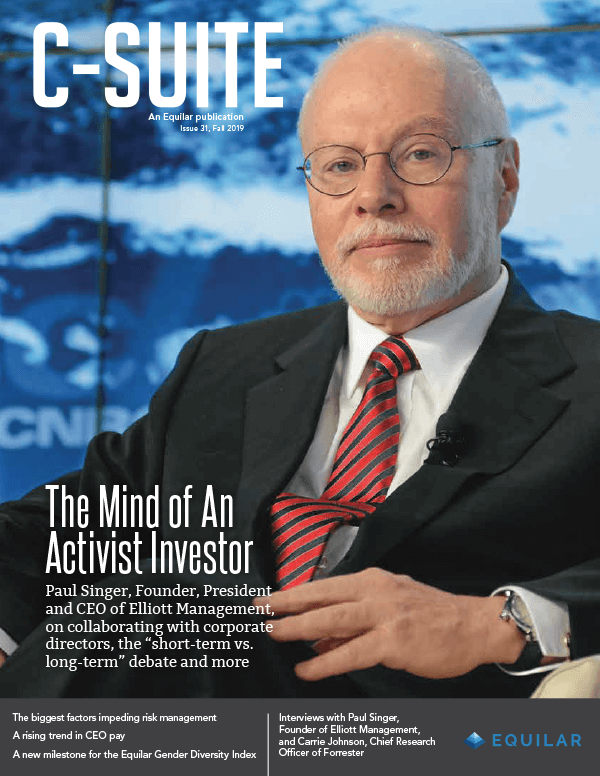Equilar Institute

Culture & Strategy Alignment
Culture is no longer a “soft” topic for companies
Investors rely on us as directors to bring independent and diverse perspectives to the boardroom based on our broad experiences and sound judgments. We must be diligent about challenging long-held assumptions, while supporting the corporate actions that may unlock long-term value. If we engage in active oversight of strategy-setting and urge management to keep their eyes on certain financial metrics, we can contribute meaningfully to a company’s growth trajectory.
As corporate America seeks to promote stronger culture and organizational environments, several companies have added disclosures around culture within their proxies.
It’s clear companies see culture as something that needs to be addressed to shareholders. As board members, if we, too, cultivate the selection and engagement of a transformational CEO who can improve company culture, we can help to jump-start expansion in shareholder value.
Increasingly, forward-looking investors and visionary boards are also thinking about the value created and risk avoided by the pursuit of a well-defined and measure corporate culture. Culture must serve strategy and protect and preserve a company’s greatest assets, its people.
In my public company board service over the last 10 years, corporate culture has moved from being considered an intangible, “soft” topic seldom-discussed in the boardroom to now front-of-mind and core to the most robust monitoring of a company’s health and future prosperity.
In fact, a late 2018 study titled the Global Intangible Finance Tracker determined that a company’s corporate culture, and its impact on talent retention and the successful delivery of products and services, could be responsible for 52% or more of an entity’s market value, and is likely to accelerate in significance.
So, how do we as directors get our arms around this critical emerging area, and what are our responsibilities from the boardroom for corporate culture?
The board should be able to define its company’s current corporate culture. Ask 10 board members to define the key elements of a company’s culture, and you are likely to get 10 different answers.
Management, and the board of directors, should be consistent in naming and modeling the organization’s culture in its decision-making and business dealings.
-
Once defined, culture has to be stress-tested for its ability to support the company’s current strategy, and adjusted if it does not.
-
Culture must be measured and monitored. As Peter Drucker, U.S. management educator and author, says, “If you can’t measure it, you can’t improve it.”
-
As a company’s strategic direction evolves and shifts, corporate culture requires constant fine-tuning and refinement, and should aspire to be a true competitive advantage.
-
Culture needs to be a key element of almost every boardroom consideration, whether it is the integration of a corporate acquisition, the design of incentive compensation, the safety and well-being of the employee base, or the pursuit of industry innovation and disruption.
Culture, consistently aligned with strategy, as well as its contribution to employee satisfaction and engagement, should be a key engine for long-term growth and the acceleration of increase in shareholder value.
Wendy Webb is a Director on the boards of Wynn Resorts, ABM Industries, and American Homes.
 Solutions
Solutions









